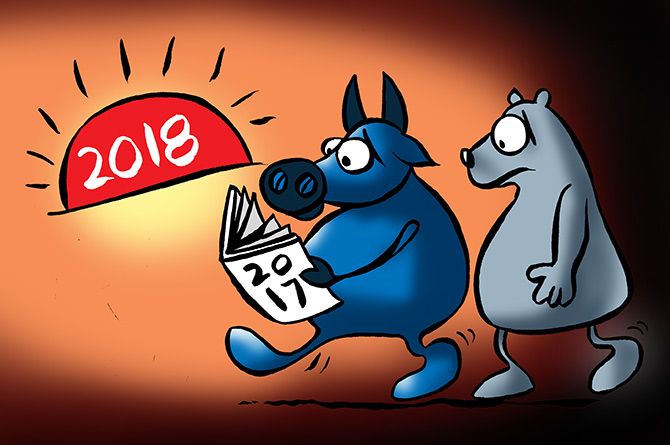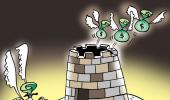If you are in credit opportunity funds, income funds or dynamic bond funds for a long-term goal, stay put, experts tell Tinesh Bhasin.

Illustration: Uttam Ghosh/Rediff.com
Debt fund investors are a worried lot today.
For many, the current trailing returns on their investments are below expectations due to the turn in the interest rate cycle.
Most long-term funds have taken a hit over the past few months. In February, returns from many income and dynamic bond funds turned negative.
To make matters worse, fund managers say that volatility may continue in the near future.
"There's no certainty on whether things will stabilise anytime soon. The factors affecting bond yields need to stabilise," says Mahendra Jajoo, head-fixed income, Mirae Asset Mutual Fund.
In the current uncertain scenario, investors who are putting fresh money in debt should look at short-term funds with an average portfolio maturity of one-three years, and having AAA-rate papers.
In a short-term fund, even if the interest rate scenario doesn't change, the investor will benefit from accrual.
"Most fixed income investors are recent converts from fixed deposits. They should opt for funds that control for both duration and credit risk. AAA-oriented short- and medium-term funds fit their profile," says Suyash Choudhary, head-fixed income at IDFC Mutual Fund.
"These funds are also attractively poised currently after the recent sharp sell-off in rates," Choudhary adds.
But if you are an investor who is putting money in debt for the long term -- as part of asset allocation for a goal that is some years away -- then fund managers recommend dynamic bond funds.
"These are actively managed funds where fund managers change the portfolio depending on the interest-rate scenario," says Dwijendra Srivastava, CIO-fixed income, Sundaram Mutual Fund.
Dynamic bond funds have been hit the most in the ongoing volatility. But fund managers say that these funds have historically outperformed other categories over the long term.
The advice for existing investors is no different.
If you are in credit opportunity funds, income funds or dynamic bond funds for a long-term goal, stay put.
Similarly, if you have parked funds in short-term, liquid, or ultra-short-term funds for a defined period, there is no reason to make any changes.
Tinker with your portfolio only if you came into long-term funds in the past two years to benefit from falling interest rates, and were trying to time the market.
When investing in a debt fund, ensure that you look at the average maturity and the credit rating of the portfolio.
It is best to match your investment horizon with the average portfolio maturity.
Interest rates could continue to remain volatile in the near future. Debt market participants are waiting to see what the regulator, the Reserve Bank of India, will do next.
Yields usually rise with increase in inflation, widening fiscal deficit, and rising global risks -- all of which have happened in the past four-five months.
But yields have risen more than they should because a large section of market participants have said they don't want to participate in RBI's auctions due to mark-to-market losses.
The government's new borrowing programme starts from the new financial year in April, and investors are worried about the steps the regulator will take to ensure its papers are bought.
Interest rate movement will also be affected by the monsoon as inflation could rise further if the rains are below normal.











